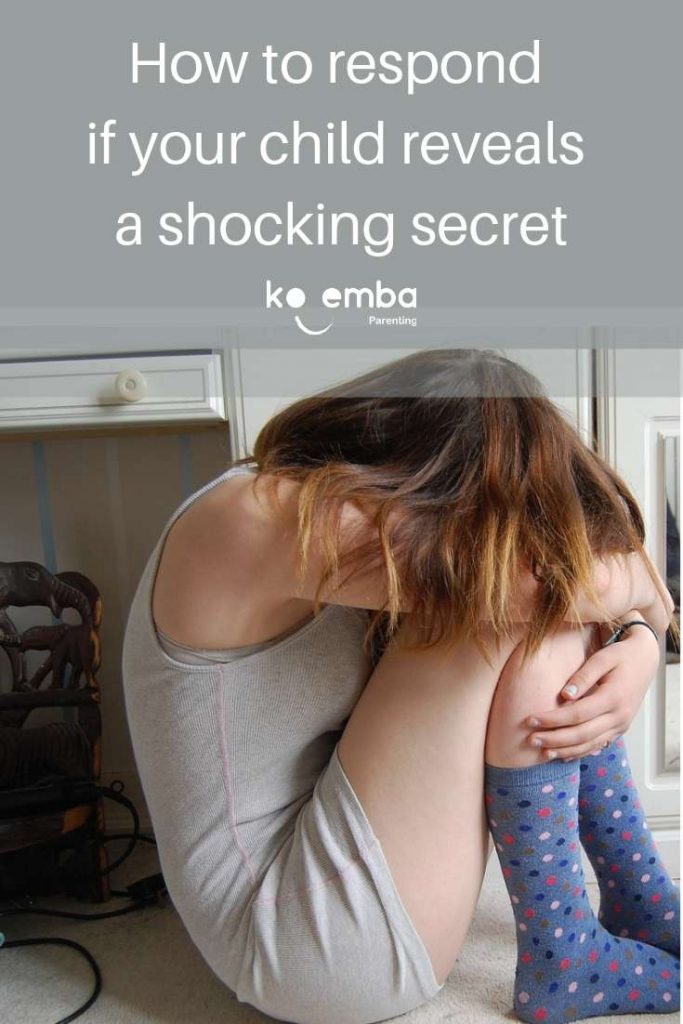Child abuse – something you never want to happen to any young person. A parent’s worst nightmare. What can a parent do if they discover child abuse? Here’s how to respond if your child reveals a shocking secret.

Even if your children are toddlers or preschoolers, this is an article you need to read, because now is the time to lay the foundation of trust and openness, so that your child will turn to you for support at times when they need you the most.
I love my daughter, And I wish I had the capacity to listen to her when she told me what happened.
These are the words of Betty de Generes, talking about her regret that she did not listen to her daughter, Ellen de Generes, when she told her about the sexual abuse she suffered as a teen.
How To Respond When Your Child Reveals a Shocking Secret
It’s a parent’s worst dread that their child might be abused; something no child or parent should ever have to experience. If you face this crisis, professional help is essential. And how a parent responds in those first few moments can be a significant part of the healing process. So here are some key tips that can help you if your child reveals a shocking secret.
-
Keep Calm
It is especially hard to keep calm because this information is hugely upsetting and the emotional brain will trigger a “fight, flight or freeze” reaction.
It’s easy at a time like this for a parent to be hurtled into an angry reaction:
– ‘fight’ mode: thoughts of revenge / furious this could have happened
– or ‘flight’: a desire to flee from the awful reality that has invaded your family, such as being tempted to say something like, “Oh, that couldn’t have happened!”
– or ‘freeze’: feel so numb you don’t know what to do or say.
This is a time to calm yourself.
Focus on your breathing, because when you steady your breathing you steady your thoughts.
-
Focus On What Your Child Needs In This Moment
Remember your child needs your love, your presence, your acceptance, your understanding and connection right now – maybe more than any other time in their life. This is a time to connect, to cross the bridge into your child’s world and be there for them, without anything obstructing your connection.

-
Park Your Own Stuff So You Can Connect With Her
In these first moments you need to consciously park all that is coming up for you, so you can be fully present for her.
So first PARK your own stuff.
- Park your emotions
- Park your solutions
- Park your own agenda
- Park your own memories
- Park your need to “make it better”.
This journey has no instant solutions – it will be a journey that you and your child will need to travel through with professional support. Right now, just focus on what your child’s needs in these first few moments – your loving, non-judgemental presence.
-
Use Your Body Language Show You Are There
Let your whole body, your soft gaze, your tone of voice show that you are listening – that you are there and trying to understand.
Turn your whole body towards your child. Let your body be open and soft, so that it is space your child can turn for comfort.
Focus on connecting.
-
Listen Deeply
Listen without interrupting.
Let your child talk as much as they need to.
Be careful not to add anything extra to what your child is saying.
It can be tempting to ask a lot of questions to clarify what happened. Or to rush into talking too much in your desperate desire to “fix it”. Remember that the pain of this situation is too great to bear alone. Your job right now is to be a safe space for your child to share their pain. Just listen.

-
Give Your Child Space to Express Emotion
Yes, your child may cry, and you might too. Tears are part of the healing process. Your child needs a safe space to shed their tears.
The tears we cry are chemically different to the tears we cry when we are peeling an onion – they contain stress hormones. So expressions like “cry it all out”, “have a good cry” make a lot of sense.
When a child experiences a violation of trust and of their very selves, there is a lot of stress to let out. Hold your child, if they’re okay with that. Comfort – without trying to stop the tears, or other expressions of upset. Acknowledge the emotion, and let them come.
Sometimes it is a son who shares a shocking secret. Their emotional reaction may be different, and they equally need your support. They may react by not wanting to talk about it or they may become angry. Respond to where your child is at – to what emotions they present. There is no “right” way to be upset. Boys often find it easier to open up about distressing incidents when the two of you are doing something, like walking alongside each other. Engage with your child in a way that meets your child’s needs.
-
Reassure Your Child
Remember how important it is for you to keep calm because your child desperately needs your unconditional love, and reassurance they have done nothing wrong. If you feel a need to say something, keep your words focused on their experience and give words that show you are there for them and that together you will find a way forward. You might respond with words like, “It makes sense that you were frightened and very upset. I’m upset, too. Let’s talk about what we can do to help you feel safe.”
“If someone in your life has the courage to speak out, please believe them.”
Betty de Genres
What To Do If Your Child Has Been Abused
First – calm and connect; stay with your child’s experience. Then seek professional help as soon as possible, both for yourself and for your child. It can be tempting to tell others, but we need to be discerning about what to share. This very personal and sensitive part of your child’s life story is not something to widely broadcast. Your child and you need professional help to determine who to tell and when.
If you have been through a harrowing time and you’re wondering if you handled it okay, seek professional help from a therapist. You can’t change the past but you can learn how to build a strong bond of connection with your child to move forward together.
NOW Is the Time Develop the Art of Listening Well
Handling a situation when your child shares a shocking secret is never easy. And, hopefully, you never have to. But it’s like coming across a traffic accident. You need to know how to give first aid BEFORE you need to!

No matter what age your children, or how calm or choppy the emotional waters are right now, why not develop the art of listening well? The great thing is we can work on improving our listening skills with our children in the small everyday interactions, including the good times. We don’t have to wait till the you–know-what hits the fan.
There is a big difference between listening and listening well – as there is between eating and eating well. And developing the art of listening well might mean that at some stage of your child’s life you will be able to pick up the warning signs that could avert a catastrophic situation.
Want to know more about how to listen well, even if your children are younger?
More Help On How To Be Present to Your Child
Here are some blogs you might find helpful to develop the skill of listening well:
Are Your Being Present With Your Child? These ten obstacles could be getting in the way
“Five Useful Tips On How to Support Your Upset Child”.
A good start can be to read my quick-read ebook “Stop Yelling – nine steps to calmer happier parenting” because it gives you practical tools on the art of staying calm, especially in stressful moments.

Now it’s over to you. What do you find hardest to park, to be fully present to your child? What helps you stay present, focused and unconditionally loving to your child, especially when it’s tough?


No comments yet.